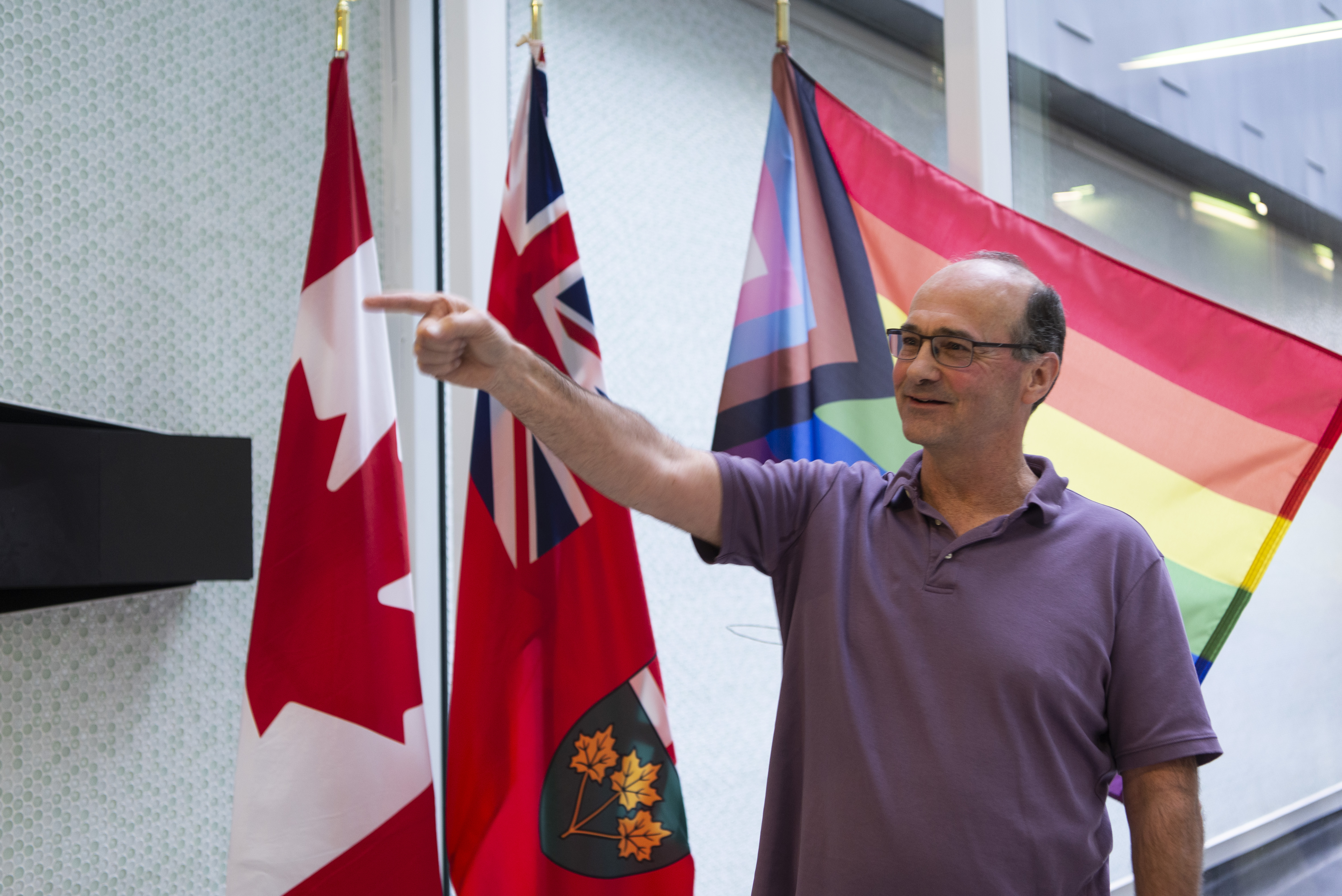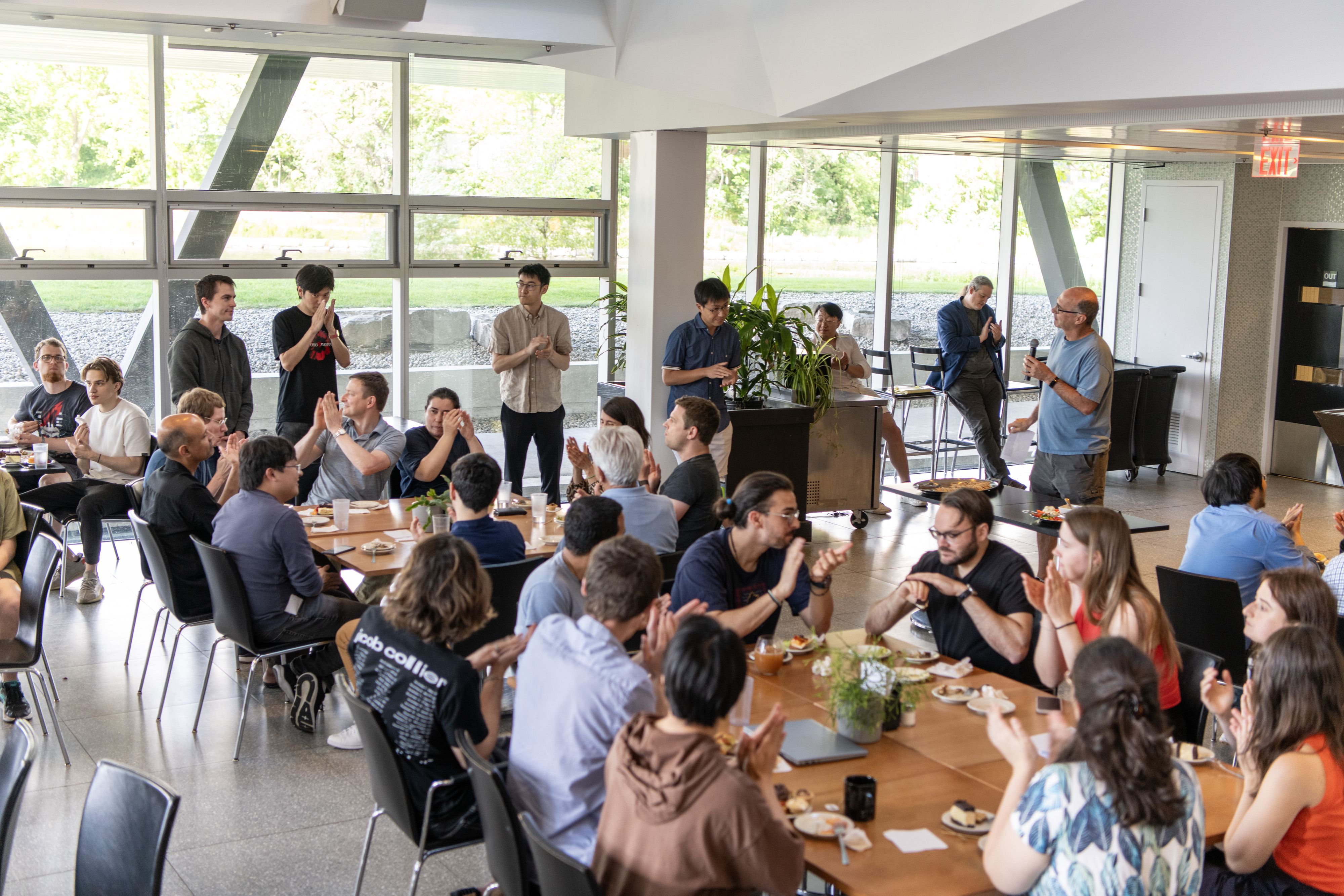The year was 2018 and Perimeter Institute had hit its stride as a world-class centre for research, graduate training, and educational outreach in theoretical physics. One challenge? The field of physics suffered from noticeable inclusivity gaps.
This is a problem across many science, technology, engineering, and mathematics (STEM) fields. So, a group of passionate Perimeter scientists and staff set about making a change, in their own institute and beyond. The initiative resulted in a review of policies and practices, with the aim to be more inclusive of community members who identify as Lesbian, Gay, Bisexual, Transgender, Queer, Two-Spirit, Asexual, and other sexual orientations (LGBTQ2A+).
“It was pretty cool at that time to see the push for inclusivity from Perimeter’s grassroots because it was literally physicists and admin staff who were pushing forward, being progressive,” says Dan Lynch of Perimeter’s Black Hole Bistro. Today Lynch is the chair of Perimeter’s LGBTQ2A+ working group, but he notes he was one of many participants when the work first began. “People were focused on making sure Perimeter was a leader, and they were looking to other institutions that were doing it well. They really wanted to benchmark us against the most progressive places.”
Perimeter hired quantum physicists Shohini Ghose as its first Equity, Diversity, and Inclusion Specialist later that year to help take actionable steps towards change.
LGBTQ2A+ inclusion has become a core part of the Inclusive PI Platform, a wide-ranging suite of equity, diversity, and inclusion (EDI) efforts. Founded in 2018, the Platform is a volunteer-led initiative composed of working groups of students, postdocs, faculty, and staff tackling EDI issues at PI. Their mission is to create the best possible work, research, and living environment for everyone at PI.
“If we want to actually attract the best in physics, and we want them to do good work, they need to feel comfortable doing their best at Perimeter while being safe and supported,” says Leanne Mendonsa, Coordinator of Engagement and Inclusion.
Olivia Taylor, Front of House Manager of Perimeter’s Black Hole Bistro adds, “there is potential for STEM and physics to be unfriendly to people who don’t fit binary definitions or specific boxes, so to say that everyone is welcome here and to mean it, is especially important given the work that we do at Perimeter.”
42 degrees social club
Lynch recalls Perimeter’s first LGBTQ2A+ working group’s social club had a name that was decidedly rooted in STEM: “42 Degrees” (the angle at which light enters a prism to become a rainbow).
Lynch says in the early days the club ensured there were opportunities to participate in events both at Perimeter and offsite, to make space for different comfort levels among participants.
“At the same time, organizers were pushing for a lot of the stuff we might take for granted now, like having the pride flag visible at the entrance of the building and on office doors, having gender neutral bathroom labels, and changing the language and some policies to include everyone,” Lynch says.
PI Pride events
Today, a large part of the working group’s role involves planning and hosting events, building on the success of Perimeter’s first ever Pride event in 2018. This year Perimeter’s Pride events are concentrated in May and June to accommodate busy schedules. An annual tie dye event is a staple in the schedule, and the working group has learned that slotting it in early gives participants opportunities to wear their finished shirts at later events. The group hosts other community-building events throughout the year.
Why it matters
What does any of this have to do with the work of physics?
“Research is not done in isolation,” says a Perimeter physicist who is a member of the working group. “Physicists have to talk to other people and collaborate. Feeling confident with who you are is an important component of collaboration. You’re human as much as you are a scientist.”
Lynch adds he has observed a shift in attitudes over the years, from passive to active support of LGBTQ2A+ community-building. “Today it’s not okay to not support this community, and I’m confident others will speak up if they need to,” he says. “That’s a huge shift, and support means a lot. There are lots of different ways to show support and to participate.”
Perimeter Institute is not alone in this effort. The Canadian Association of Physicists (CAP) has been pushing for inclusivity in physics for many years, starting with their Committee to Encourage Women in Physics (CEWIP) in 1983. In 2020, the committee’s name was changed to the Division for Gender Equity in Physics to be more inclusive of all identities, and the CAP has recently published a list of 2SLGBTQIA+ resources for physics students across Canada.
About PI
Perimeter Institute is the world’s largest research hub devoted to theoretical physics. The independent Institute was founded in 1999 to foster breakthroughs in the fundamental understanding of our universe, from the smallest particles to the entire cosmos. Research at Perimeter is motivated by the understanding that fundamental science advances human knowledge and catalyzes innovation, and that today’s theoretical physics is tomorrow’s technology. Located in the Region of Waterloo, the not-for-profit Institute is a unique public-private endeavour, including the Governments of Ontario and Canada, that enables cutting-edge research, trains the next generation of scientific pioneers, and shares the power of physics through award-winning educational outreach and public engagement.

